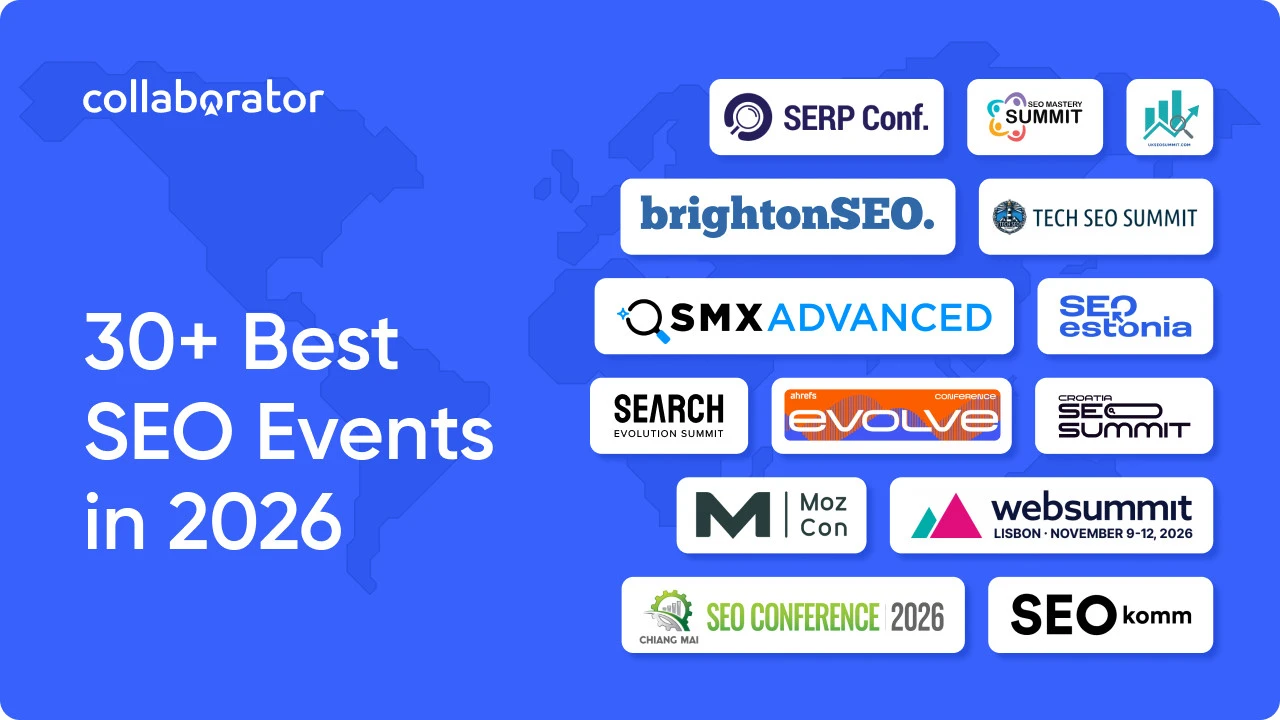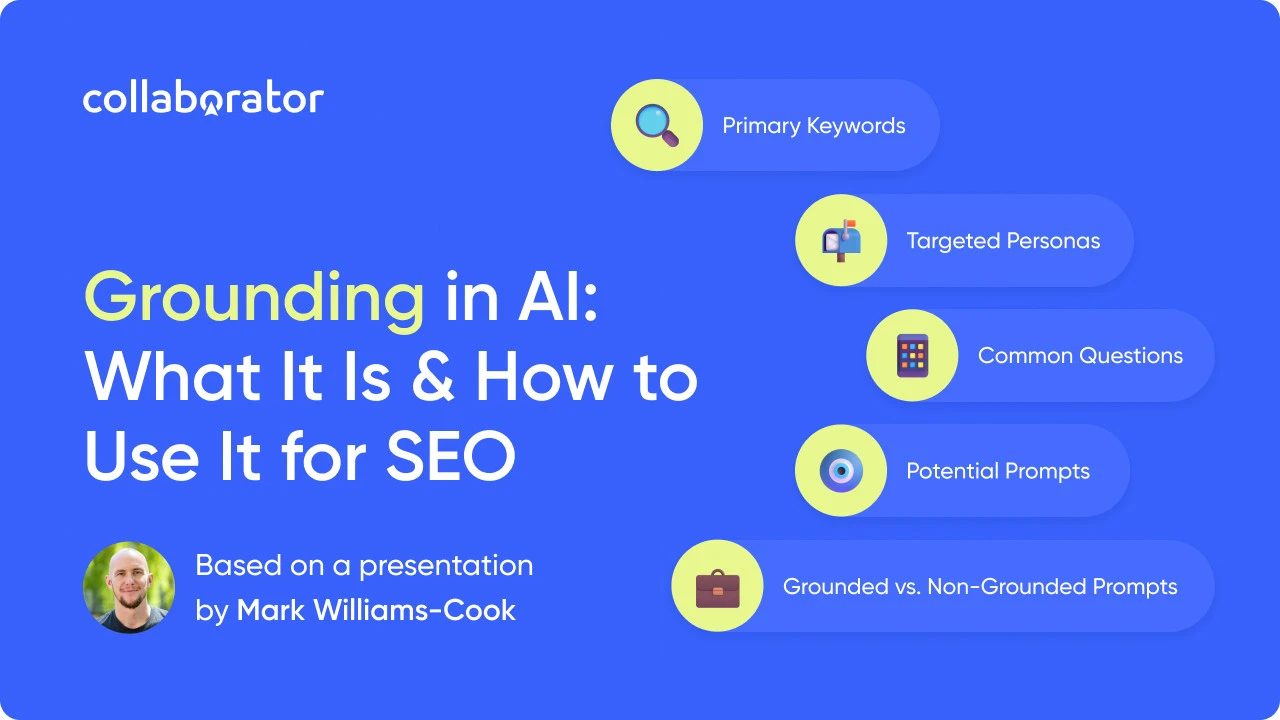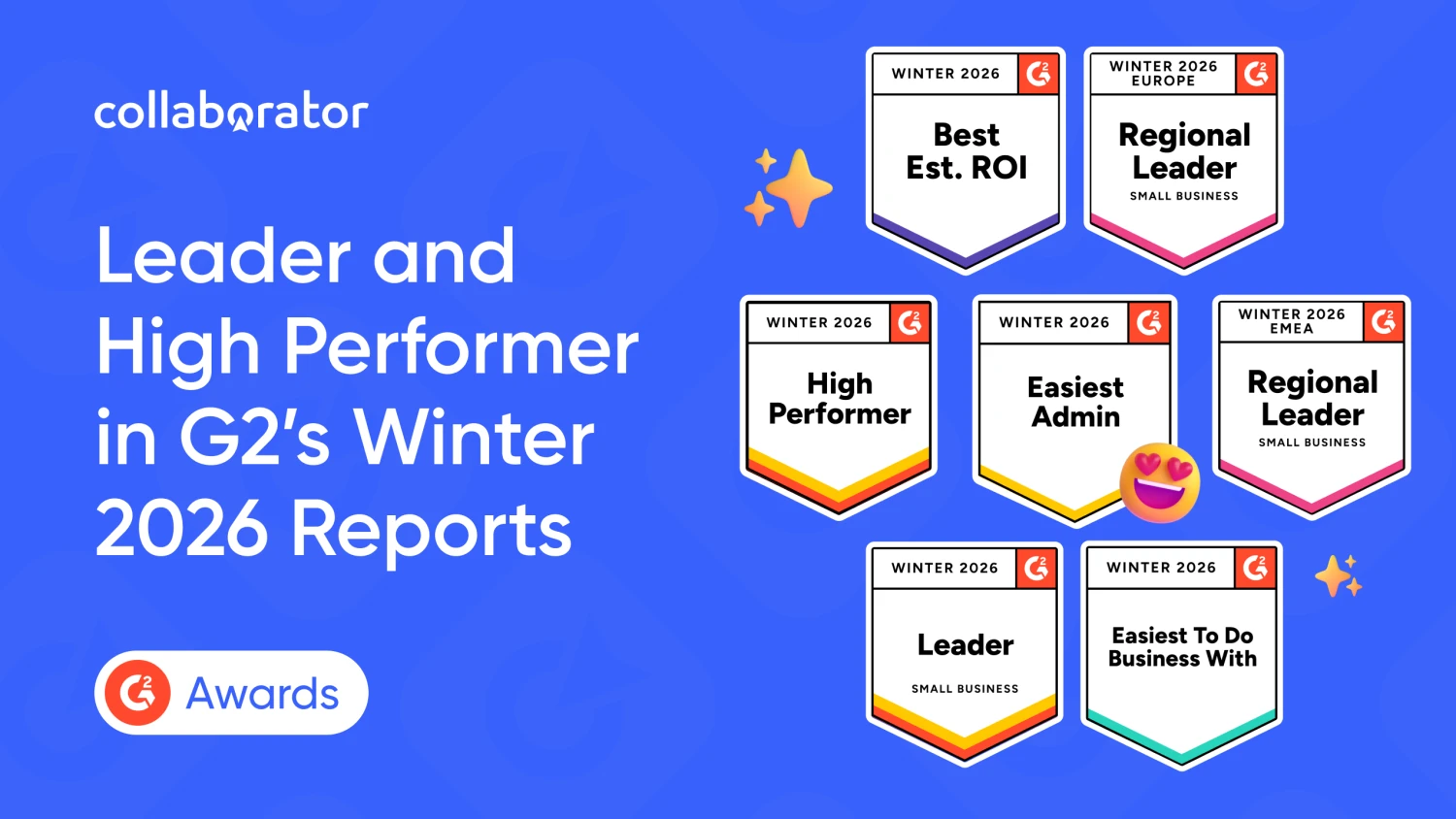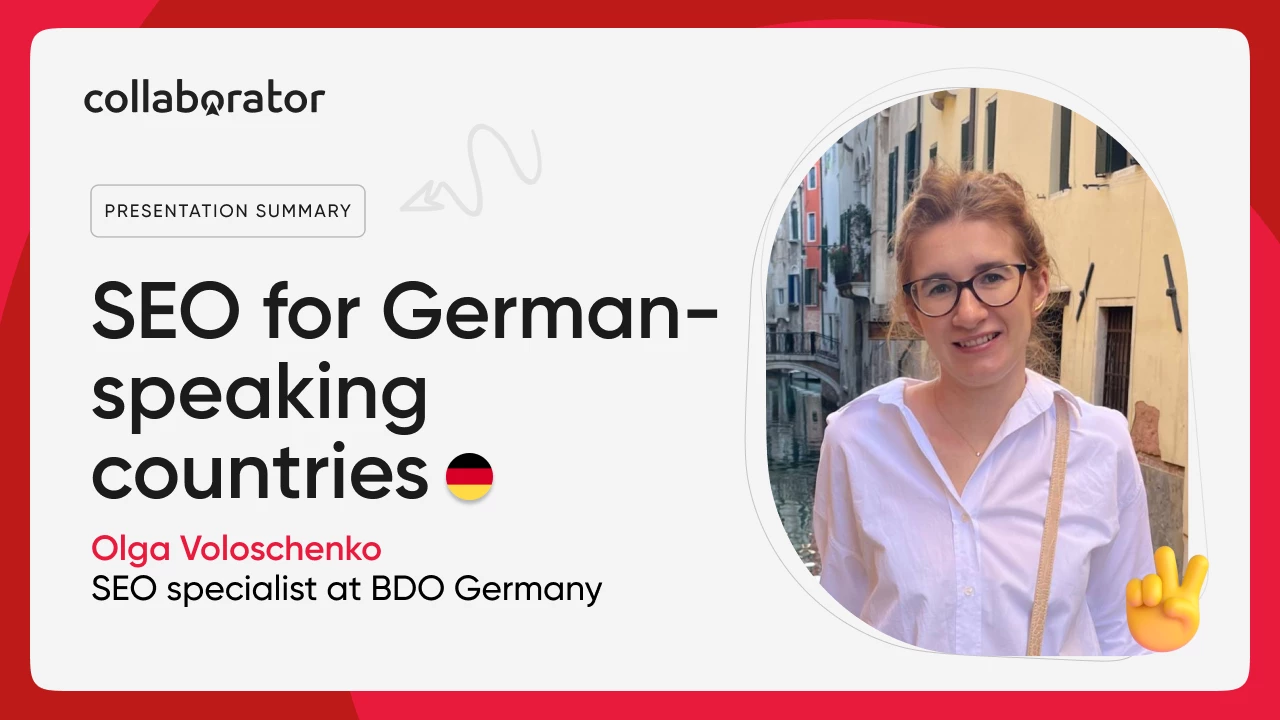
A lot of people are struggling with implementing international SEO, as it’s different from their local SEO. Today we’re going to be exploring whether the country domain affects SEO and how to optimize websites for Germany and different countries of the DACH region.
Meet Olga Voloshchenko — an SEO specialist with over 10 years of experience. During the recent Collaborator’s webinar, she shared her knowledge on specifics of search engine optimization in Germany and the German-speaking DACH region, Belgium, Luxembourg, and Liechtenstein.
We’ve decided to write down and summarize some of the main points of her presentation, including some of the top German SEO tools for keyword analysis, position tracking, website audits, and other SEO processes for website promotion.
So let’s dive in!
About the Speaker

A few facts about Olga Voloshchenko and why you should follow her recommendations:
- Olga’s experience in SEO started back in 2012, and in 2023, she took on an SEO specialist role at BDO Germany.
- She has extensive experience crafting successful campaigns across international markets.
- She specializes in developing SEO strategies in the German market.
Given her rich professional background, she surely knows all the tips and tricks to succeed in DACH promotion.
Next up — a summary of Olga Voloshchenko's presentation with tips and recommendations👇
SEO Promotion for Websites in German-Speaking Regions: Choosing the Optimal Strategy
First things first, you’ll need to identify the target audience and choose an effective website optimization strategy. It’s also essential to understand the number of German-speaking users in the countries where you want to promote websites and find customers.
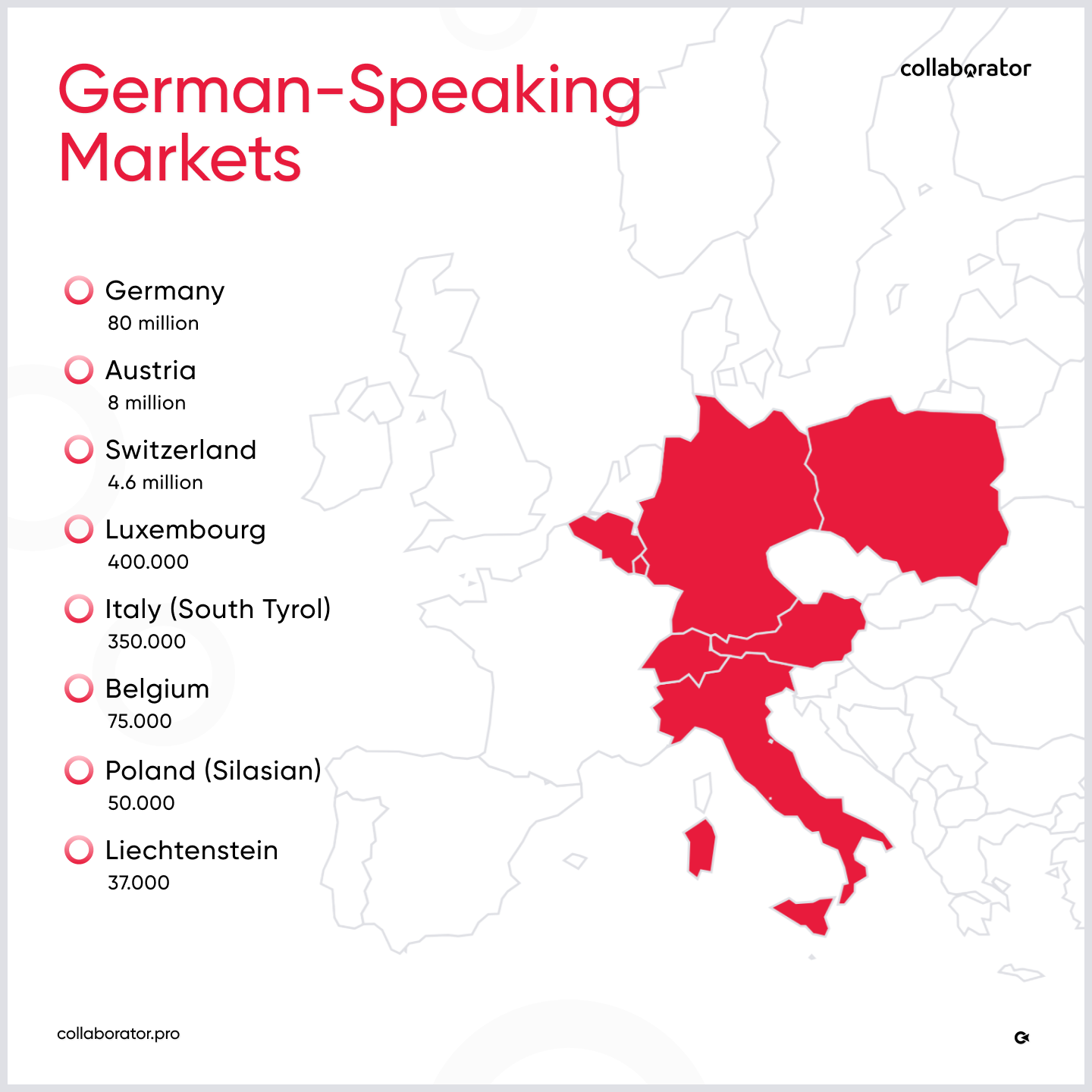
In addition to Germany, Austria, and Switzerland, the German-speaking countries also include Belgium, Liechtenstein, parts of Luxembourg, Italy (South Tyrol), and Poland (Upper Silesia).
Brief overview of the specifics of different regions:
- The largest share of German-speaking users among the DACH regions is – you guessed it – in Germany, with approximately 80 million people!
- There is a significant Arabic and Turkish diaspora in Germany. But don’t worry about creating a Turkish or Arabic website language. Due to strict immigrant integration laws, newcomers are required to learn German, and 90% of the country’s population speaks the official language.
- About 60% of the population in Germany also speaks English.
- People living in different Swiss cantons speak different languages. German is the most widespread (62.3%), followed by French (22.6%), Italian (8%), and English (5.8%). So, if your goal is to reach a wider demographic for your website promotion, you may want to optimize websites for different countries.
- In Austria, the language distribution is as follows: 70% of Austrians speak German, and 25% speak English.
- In Luxembourg, the national language is Luxembourgish, while German and French hold the status of official languages.
- In Belgium, the prevalent languages are German, Dutch, and French. So, if you want to get more German-speaking customers, you’ll want to create three language versions of the new website online.
- In Liechtenstein, a small country (or a great principality, as they call themselves), people only speak German.
Additionally, 79.7% of all desktop and 96% of all mobile searches are conducted via Google, while only 14% and 0.89% respectively are done via Bing, and 2.5% and 0.28% respectively are done via Yahoo. Therefore, your primary focus should be on optimizing your website specifically for Google.
TOP German SEO Tools
German companies take compliance very seriously, which affects the choice of SEO tools for work. Due to strict data protection laws, their companies mostly don’t trust services that are not registered in Germany, or, at least, in Europe. That’s why some of the popular SEO tools like Se Ranking or Ahrefs might not get their approval.
That’s why we’ve prepared a list of top German SEO tools for website promotion and advertising. Take a look at our infographic that categorizes them by various needs, and compare the best SEO software in Germany yourself:
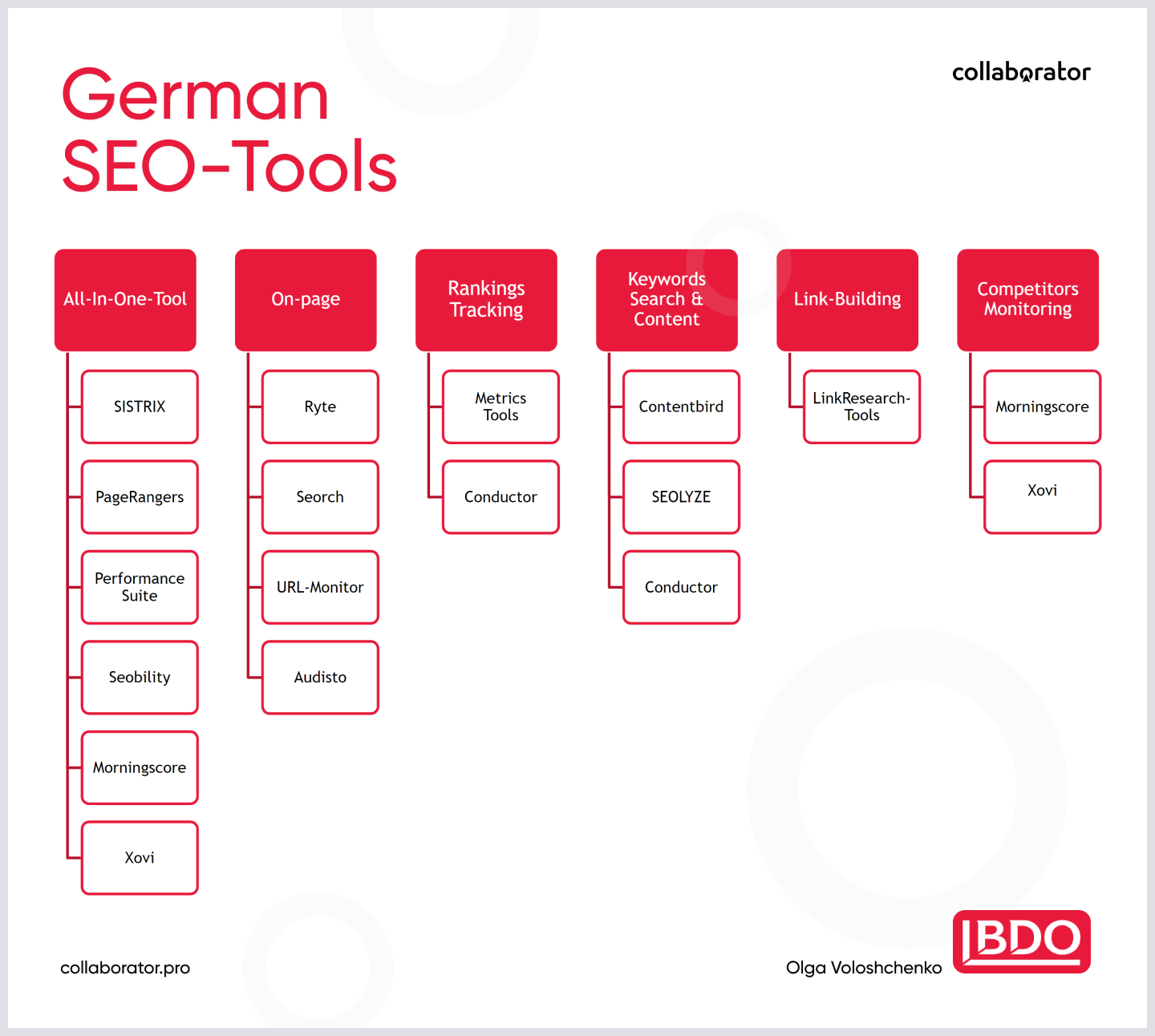 German SEO services offer a wide range of features: keyword research, rank tracking, backlink analysis, competitor analysis, and more.
German SEO services offer a wide range of features: keyword research, rank tracking, backlink analysis, competitor analysis, and more.
You can also check out our overview of TOP-60 search engine optimization tools for more options. Now, let's take a detailed look at Sistrix — one of the most popular German-made SEO services that provides essential metrics for discovering new optimization opportunities.
Sistrix Overview: Features and Capabilities
Sistrix's popularity is justified: not only does it allow you to conduct thorough competitor analysis, but it also helps identify growth points to improve both website ranking and organic traffic. If you’re looking to create perfect content, Sistrix is the way to go!
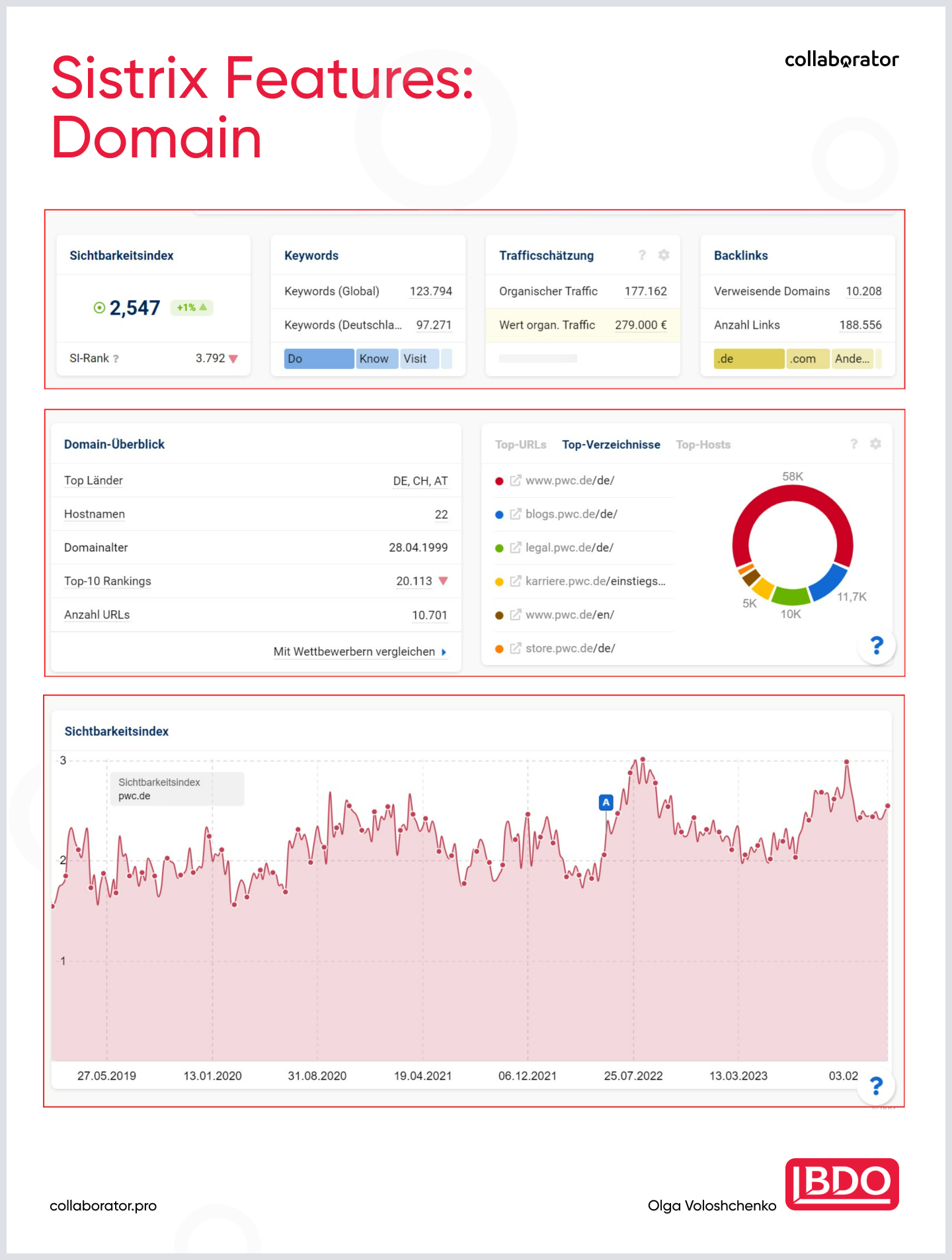 Domain analysis, keyword analysis, content planning, and technical analysis are some of the main features presented by Sistrix.
Domain analysis, keyword analysis, content planning, and technical analysis are some of the main features presented by Sistrix.
The dashboard includes:
- Sichtbarkeitsindex — the visibility index, which is calculated based on the number of keywords and their Search Volume;
- Keywords;
- Traffic estimate;
- Backlinks;
- General site overview;
- Top pages.
It also allows you to take a deeper look into each of these metrics.
Sistrix provides data on Search Volume, click count, keyword profile with competitiveness distribution for both desktop and mobile versions, and cost per click. Additionally, you can view the Search Volume across different countries, along with the distribution of keywords by intent, relevant keywords, and similar queries. All metrics are conveniently collected and presented on a single dashboard.
But it gets even better than that — Sistrix also offers an AI assistant to help with content creation. It assists you in determining the required text structure, such as a Pros and Cons list, press release, regular blog article, and landing page. All you have to do is input your keyword, and the AI assistant generates a complete content plan for your website promotion. How amazing is that?
Pros and Cons of German-made tools
Certainly, like any SEO tool on the market, German tools have their pros and cons.
Let's take a detailed look at them:
|
Pros |
Cons |
|
Language and region: focused on the German market |
Limited functionality: while international tools compete on a global stage, German SEO tools primarily compete amongst themselves. That’s why they present accurate data but provide very limited features. |
|
Data relevance: they offer keywords and trends that are specifically relevant for German-speaking audiences. |
Insufficient data relevance according to Google Updates: the frequency of data updates in response to the latest algorithm changes is not up to par. |
|
Features and capabilities: tailored to the German-speaking users' needs. |
Weak UX and outdated design: some of the dashboards are not really user-friendly, and you have to take additional steps to get the information you need. |
|
Tips and insights for regional SEO: they offer insights for a better understanding of the cultural and regional specifics of German SEO practices. |
High cost: they’re not cheaper than Ahrefs, so you won’t get to save any extra euros. |
SEO Features in Germany and for German-Speaking Markets: Website Localization
Mostly, website localization in Germany is similar to what you’re already used to. However, there are some nuances. Let’s take a look at them.
Domain or Subdirectory: Which One to Choose?
First things first, you’ll have to determine whether you’ll be using a separate domain, a subdirectory, or a subdomain. Especially, if you already have the English version of a website.
 When choosing a domain, prioritize two things: the country where you will primarily promote websites, and the niche. By the way, .de is one of the most popular domain zones in Germany.
When choosing a domain, prioritize two things: the country where you will primarily promote websites, and the niche. By the way, .de is one of the most popular domain zones in Germany.
Here’s my observation, which is quite limited and is based on the niches I have worked with: in German, Swiss, Austrian, and Belgian Google search results, domains of these respective countries typically rank at the top. Therefore, if you’re targeting your website towards Switzerland, it would be ideal to have a .ch domain, or .at for Austria.
However you also need to consider your niche: some of the domains are easier to register and can help you avoid verification issues later on. German domains usually don’t have this issue, same as Switzerland, Austria, Belgium, Luxembourg and Lichtenstein.
Luckily, there are alternatives! For instance, you could register a .de domain, which also ranks well for both Switzerland and Austria. And if your English website version and your domains differ in search engine results, you can try to create a German version as a subdirectory.
Mandatory Legal Pages
While working on website promotion in Germany and DACH regions, it’s important to comply with their laws. It’s mandatory to create the specific legal pages that are thoroughly reviewed. If they are absent, you can even get fined for their absence.
Some of these pages include:
1. Impressum.
Here you’re supposed to credit all the sources for the information presented on the website – in simpler terms, info about the owner of the website, a business, or a person responsible for the provided content.
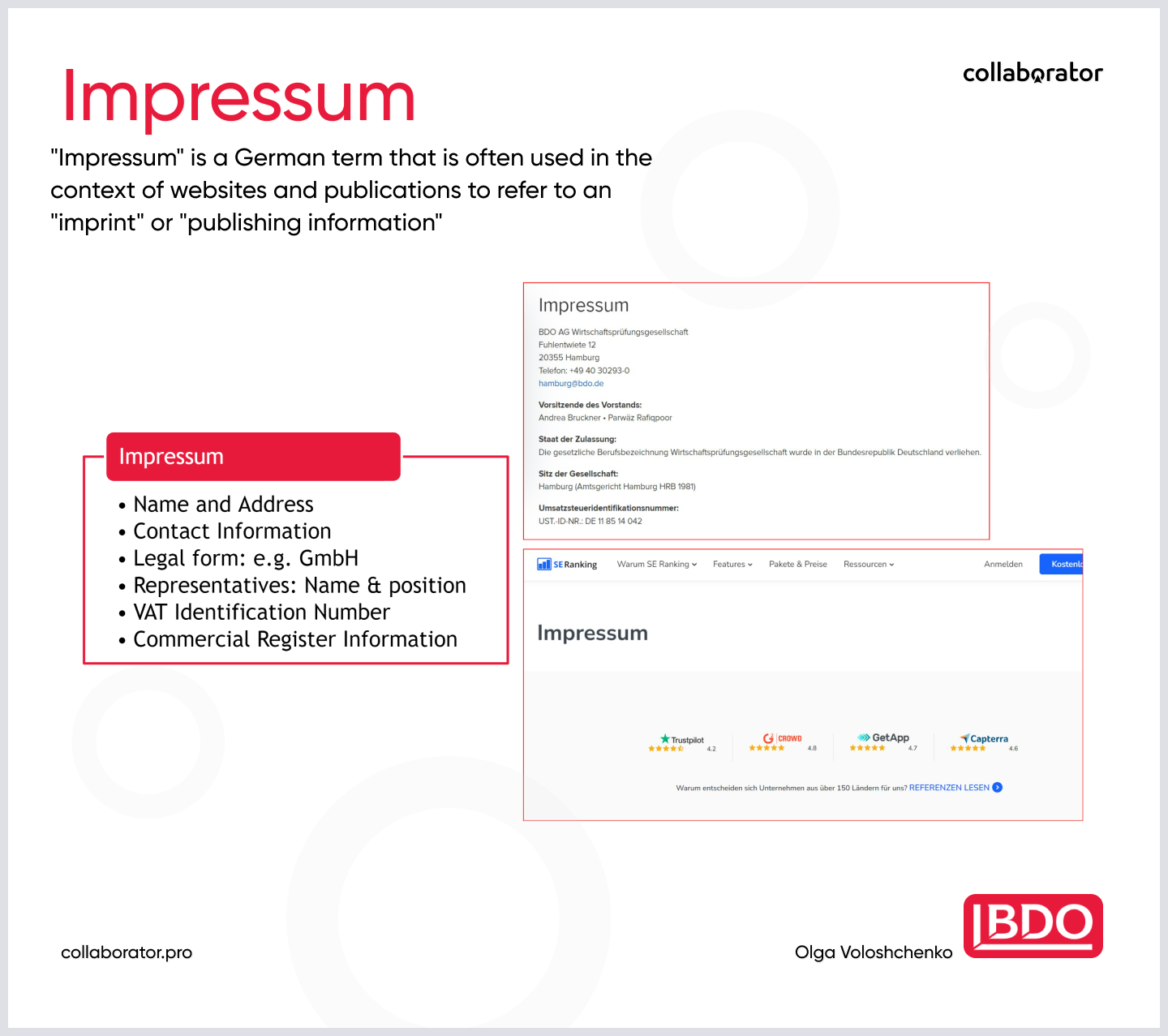 Main structural elements of Impressum and examples of correct and incorrect formatting
Main structural elements of Impressum and examples of correct and incorrect formatting
2. Datenschutz, or what we know as Privacy Policy. You should pay special attention to Cookies and Tracking, as according to GDPR (which stands for General Data Protection Regulation), you must have the users’ consent for tracking their data. Meaning that Google Analytics scripts can not be rendered without consent.
3. Haftungsausschluss. It’s a disclaimer where you should specify that the website owner is not responsible for specific information presented on the website. For instance, in a medical field you could say that the medical advice could not be interpreted as a doctor's note, and all the decision-making is solely the responsibility of the user.
4. Kontakt — this one speaks for itself🙂
There are a lot of SEO tools that will help you generate and add to your website these legal pages to your website.
But remember: even if your website is localized, these pages must be there.
Umlauts in URLs
Yet another important technical nuance is the correct transliteration of umlauts. It’s just as important for search engine optimization as it is for the end user.
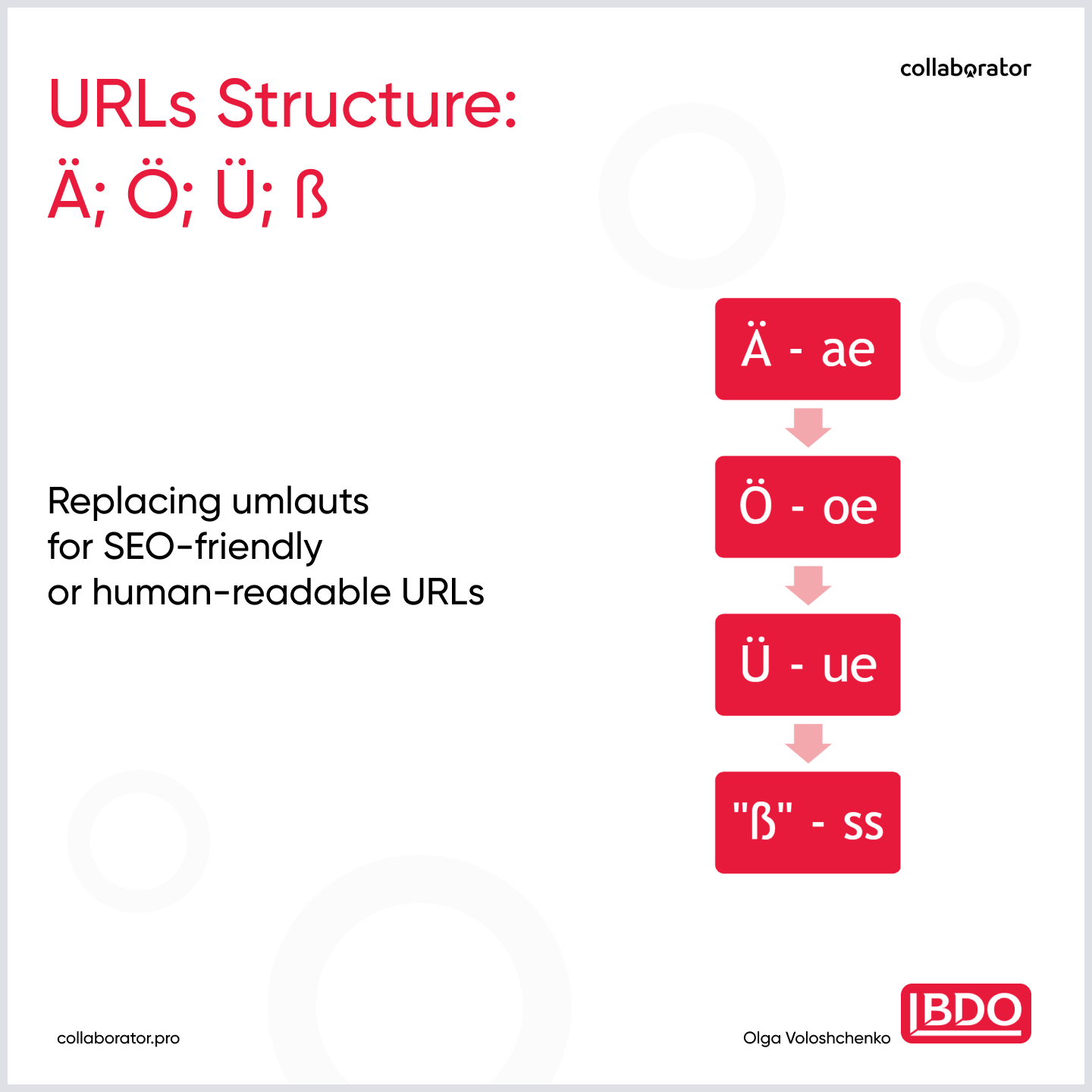 This simple infographic will help you easily remember the correct transliteration of umlauts for your URLs. It will also help you avoid some of the most common mistakes made when creating a website address.
This simple infographic will help you easily remember the correct transliteration of umlauts for your URLs. It will also help you avoid some of the most common mistakes made when creating a website address.
Keywords analysis: German market SEO specifics
When creating a website from scratch, follow the same steps that you do when creating an English website. If you already have an English version of your website, avoid simply translating keywords to German – it’s important to localize the keywords based on the German market research.
When I was working on SAAS, we had a website network, one of which was dedicated for Location Tracking, and one of the sections was for Location Tracking without access specifically. If you translate it to German word-for-word, this query would look like «Handy-Ortung, ohne dass sie es wissen». This keyword doesn’t have any Search Volume - therefore, creating a page based on translated keywords doesn’t make sense.
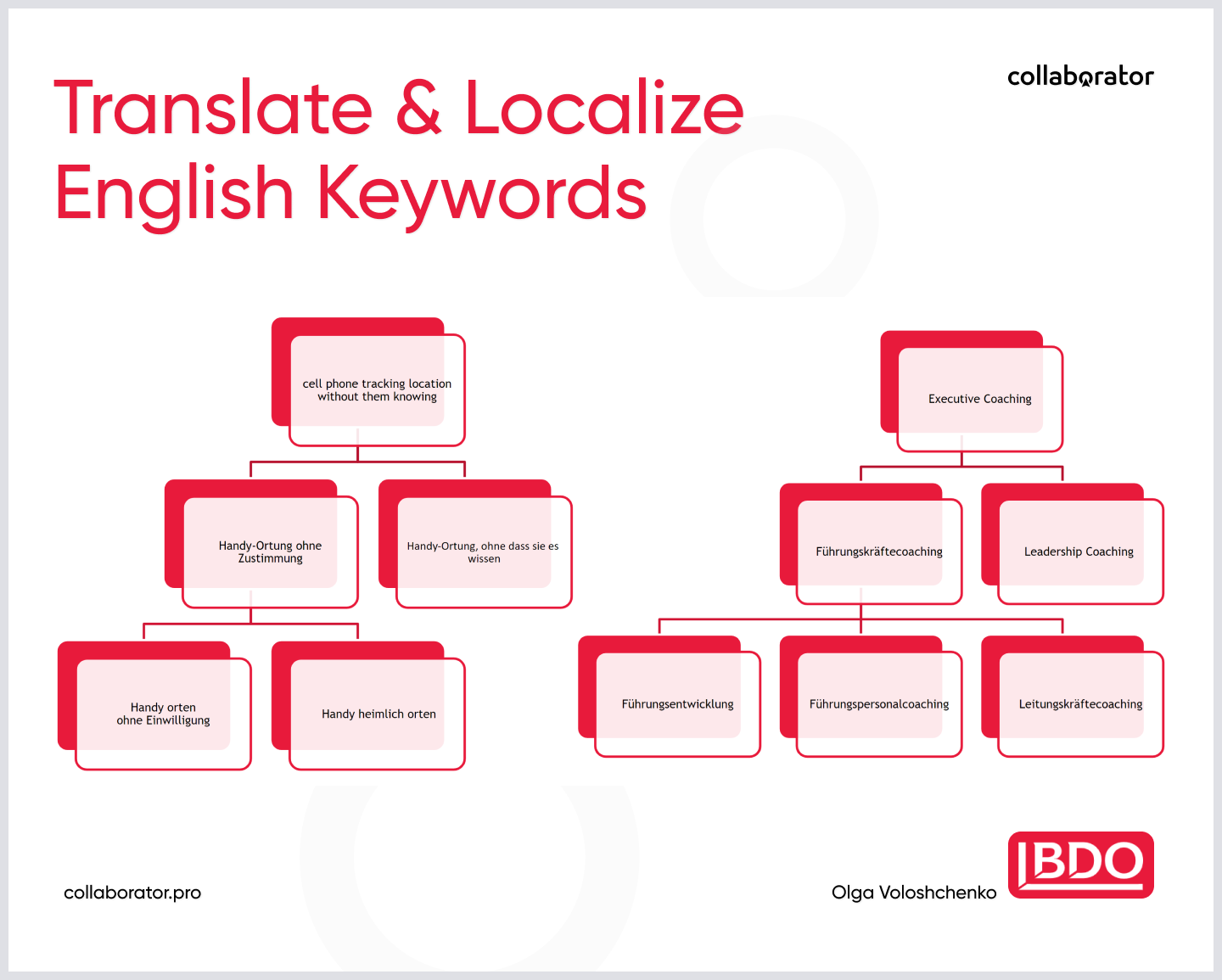 With German market expansion, it’s important to note the language specifics - the sentence structure and the popular queries of German users
With German market expansion, it’s important to note the language specifics - the sentence structure and the popular queries of German users
To generate organic traffic, you'll need to find relevant terms in German. For instance, if your English keyword is "without knowing," in German it would be "ohne Zustimmung" or "ohne Einwilligung," meaning "without permission," or "heimlich," which means "hidden." It's clear that the search intent is not always a direct translation from English or any other language.
Competitor Analysis, Keyword Selection, and Content Optimization
The main principles of German SEO include researching your competitors and conducting a detailed analysis of their keywords, backlink profiles, strategies, as well as their content, rankings, and social media presence. You gotta learn only from the best in the market.
To optimize content internationally, it's essential to analyze not just what's written, but also how it’s written: how detailed, thorough, and expertly your competitors address a specific intent, and what exactly enables Google to rank them at the top. This analysis will allow you to create content that more fully satisfies the intent and is relevant to your keywords. Such content has a better chance of ranking higher than merely optimizing the structure, scattering keywords throughout the text, or overusing them.
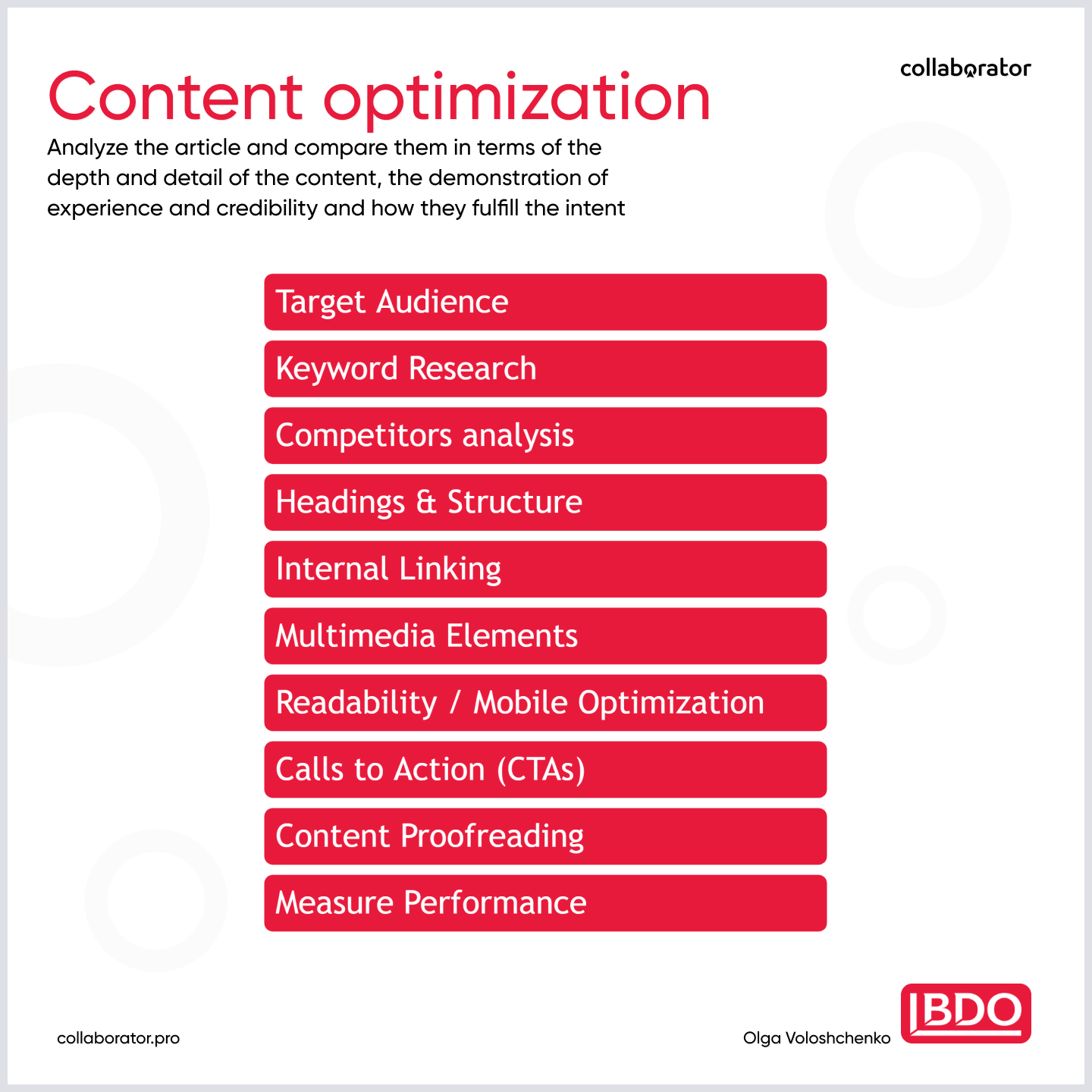 Key stages of international content optimization that you can use for German promotion and advertising.
Key stages of international content optimization that you can use for German promotion and advertising.
It might be a good idea to involve German native speakers or those who know the language fluently to proofread your copy, or even outsource your copywriting.
Here are some of the characteristics of a qualified German writer:
- fluent German with excellent knowledge of grammar rules;
- understanding of German culture, target audience, and search demand trends;
- diverse high-quality portfolio;
- knowledge of basic SEO principles;
- good reviews.
First and foremost, stick to your budget, needs, and the values of your project. Next, critically evaluate the complexity of your content – sometimes using AI tools can be sufficient to create an article. As an example, you can use ChatGPT for SEO and generating ideas for your content.
You can also consider translating, adapting, and localizing the content using the necessary keywords. In both instances, it’s worth having it proofread by native speakers. This approach will help you save money while still generating traffic.
Q & A
What is the level of competition and content quality like in the German market?
Compared to the English-speaking market, the competition is obviously lower, as the market is smaller. Quality SEO is in demand in Germany. The competition in the smaller German-speaking countries of the DACH region would be much lower, so if your business is in a highly competitive niche, I would recommend starting with optimizing it for Switzerland or Austria. The average transaction value here is very high, so the lower traffic would be compensated by the larger transaction value.
Content quality for SEO in Germany is very high. The thing is that for most of the niches, such as consulting, and pharmaceuticals, Google won’t rank the website until it is officially registered. Google has explicitly stated that they remove all responsibility and only will rank licensed businesses and well-known brands. Therefore, this niche has a high standard for content quality.
If your goal is to create a website with a long-term perspective, your content will have to be perfect because Google will make sure of it. If your strategy is more like a conveyor belt and you’re simply mass-generating websites and only need one of them to rank at the top, then don’t bother.
What should be your language level if you’re targeting the German market? Will English be enough to use for documentation and communication within the team?
If your English or German is at B2 level, you can confidently apply for the job. To evaluate yourself, think about this: if you’re comfortable with undergoing a job interview in any of those languages, you should be comfortable working with them. The IT sector is mostly English-speaking.
Documentation can be either in English or in German. If it’s a fully-German company, then 90% of documentation is going to be in German. That’s another reason to use the German SEO tools that we’ve shared in the presentation: if you’re the one responsible for creating reports, they’re going to be created in German automatically.
How long, realistically, does it take to learn German to have your emails look good?
If you don’t know German, write in English. Germans won’t mind🙂 But find someone to help you with nuances. To learn German, apply for Goethe-Institut* - three years and tons of money later, you’ll learn the language and receive a certificate.
*Goethe Institut implemented the German Promotion Project (GPP) as a part of the English schools curriculum.
Which additional sources would you recommend to get traffic from in Germany (e.g., Pinterest)? What’s trendy in Germany?
Among German audiences, the most website traffic you can get is from local forums. You can find a niche you’re in and create posts about it, spicing it up with SEO-optimized articles for link building and organic traffic. You could also try to add on some affiliate backlinks, but you would get banned as soon as they detect it. But maybe you’d get some conversions from it anyway.
Is there any benefit to using Keyword Planner by Google, or is it better to stick to Ahrefs ro Sistrix?
Generally, it’s best to use all of it: the Keyword Planner, the Google Search Console. But what’s even better, is concentrating on specific tools rather than generic ones. Try picking one of the instruments I mentioned in the presentation. For the paid ones, you can use a 14-day free trial, which most of the top SEO tools are offering. But there are some completely free SEO tools for various tasks out there as well.
Is it true that the German audience prefers typo3 cms websites and if so, why?
Yes, they do love them a lot 🙂 The interface and UX might be challenging, but in terms of optimization and page speed, they are often better than WordPress. They can also be more difficult to hack.
What would be the link building strategy for Germany?
It’s a very general question. It depends on your niche, and you have to build your German SEO strategy from there. I can share BDO’s strategy as an example, but it won’t be helpful for 90% of the audience. We don’t buy guest posts at all, don’t do forums, and don’t do crawling. What we do though, is internal backlinking, because a lot of insights and newsletters are being generated daily – that’s our niche-specific. And they are cross-linked with the main landing pages.
Another tactic we use is collaborations with financial news magazines: they publish an article and get a comment from our expert, and we get a backlink for our expert and for the landing page where he is presented as their partner. That’s our specific approach. We also order press releases from publishers when BDO releases new features.
If needed, we can also use standard methods like guest posting. You can find and partner with local websites if your website is a brick-and-mortar business. You must do a thorough research in order to find out-of-the-box methods that will suit you.
In terms of the German link markets, don’t even bother looking into them. They’re just not worth the prices.
What are the requirements for an SEO specialist in Germany? Do you need to know SMM, PPC, etc.?
Generally, German companies prefer to use local agencies for promotion. An SEO specialist should know PPC and have basic knowledge of development to be able to delegate tasks to the team. SMM is not necessary. The most important part is communication, so focus on the language first and foremost.
Regarding the SEO skills, Ukrainian specialists are really competent 🙂
What about SEO salaries?
Generally it will be higher than in Ukraine, but not millions either. The maximum salary can be around €4,000-€5,000 monthly, with the minimum starting from €1,000 monthly, ranging from Junior to Head positions. But you can always negotiate the salary reviews.
You can start with letting the employer know your preferred hourly rate and have it backed up by your experience and knowledge. Then you can go from there.
Which AI detector would you recommend to use for the German market? And what about AI trends in Germany in general?
AI trends in Germany are the same as everywhere: tons of content is being generated, translated, and adapted. But it’s important to realize that AI detectors aren’t specifically working great even with the English language which they were trained on. With German, the situation is even worse. The footprints are always there - any native speaker, who’s proofreading the content, will see them right away, as nobody talks like that. But still, the quality of AI generated content is really high.
Is the Impressum page supposed to be indexed by Google? Or it doesn’t have to be unique? Can I just copy it from someone?
You could copy it or have it generated by the Impressum generators, but it’s better to use your company’s real contact info as the identity verification requests are not uncommon.
Collaborator’s team thanks Olga for such a helpful and insightful presentation. We’re sure that her SEO tips and tricks will help your German project promotion and your website will be able to rank as the top of the SERP.
By the way, Collaborator's catalog has over 1200 German-speaking websites🙂


